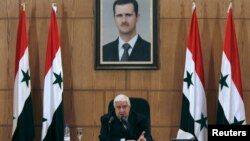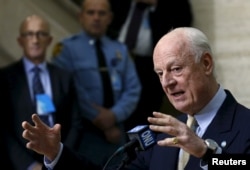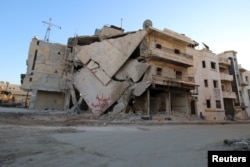Syrian Foreign Minister Walid al-Muallem warned Saudi Arabia not to send troops to his country, threatening, during a press conference Saturday, that troops would be sent back home in coffins.
The audience of journalists, top government officials and other invitees applauded politely as veteran Syrian Foreign Minister Walid al-Muallem spoke defiantly about U.N.-sponsored peace talks in Geneva and about continuing military operations “until terrorists are defeated.”
Muallem insisted that the Syrian government would not agree to any cease-fire on the ground, despite U.N. efforts, so long as Islamic State, al-Qaida and other “terrorist” groups continued to fight in the country. He also warned Saudi Arabia not to send forces to fight in Syria.
He says that logic would preclude any (Saudi) ground intervention in Syria, but that the folly of the Saudi regime means that nothing can be excluded. He warned Saudi Arabia that any aggression on Syrian soil would result in the aggressors being sent home in wooden (coffins).
Saudi ready to send ground troops
Saudi Defense Ministry spokesman General Ahmed al-Assiri told Arab media Friday that his country was ready to send ground forces to fight in Syria.
He says that the Saudi Kingdom is prepared to participate in any ground operation in Syria that is agreed upon by the (U.S.-led) anti-Islamic State coalition.
U.S. President Barack Obama welcomed the Saudi offer to send troops, during a press conference in Washington, Friday.
Geneva talks
Foreign Minister al-Muallem went on to criticize U.N. envoy Steffan de Mistura for conducting talks with Syrian opposition leaders whom he claimed “don't represent the Syrian people.” He also blasted armed groups fighting the government and thanked Russia for its military help:
He says that Russia's role won't end until the defeat of the Islamic State, Jabhat al-Nusra and other groups tied to al-Qaida, which is in accordance with U.N. resolutions.
Worsening situation
Nadim Shehadi, who heads the Issam Fares' Center at Tufts University's Fletcher School of Diplomacy, argues that the situation in Syria will continue to get worse, so long as the Syrian government and its allies are not met with an adequate counter-response.
"There is now increasing recognition that Russia, Iran and the [Assad] regime are pursuing a military solution in Syria and that this is not being confronted by the U.S. and its allies and that this will lead to more frustration and radicalism in the region,” he said.
Dubai-based Middle East analyst Theodore Karasik contended, however, that interventions by U.S. allies and Syrian government foes Saudi Arabia and Turkey would be “madness” given the “the highly charged atmosphere,” but “nothing should surprise us anymore.”
Veteran U.S. Mideast envoy Richard Murphy, a former ambassador to both Syria and Saudi Arabia, told VOA that "the hostility of the Saudi regime for the Syrian regime is public knowledge" and that "Riyadh [has the] conviction that the Syrian regime has become a puppet of Tehran," its regional nemesis. But, he argued, the U.S. has nevertheless "been urging Arab states to concentrate on fighting Islamic State [rather than the Syrian regime]."






